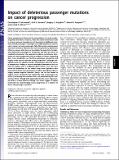| dc.contributor.author | Korolev, Kirill Sergeevich | |
| dc.contributor.author | Sunyaev, Shamil R. | |
| dc.contributor.author | McFarland, Christopher D. | |
| dc.contributor.author | Kryukov, Gregory V. | |
| dc.contributor.author | Mirny, Leonid A | |
| dc.date.accessioned | 2013-09-11T12:10:53Z | |
| dc.date.available | 2013-09-11T12:10:53Z | |
| dc.date.issued | 2013-02 | |
| dc.date.submitted | 2012-08 | |
| dc.identifier.issn | 0027-8424 | |
| dc.identifier.issn | 1091-6490 | |
| dc.identifier.uri | http://hdl.handle.net/1721.1/80381 | |
| dc.description.abstract | Cancer progression is driven by the accumulation of a small number of genetic alterations. However, these few driver alterations reside in a cancer genome alongside tens of thousands of additional mutations termed passengers. Passengers are widely believed to have no role in cancer, yet many passengers fall within protein-coding genes and other functional elements that can have potentially deleterious effects on cancer cells. Here we investigate the potential of moderately deleterious passengers to accumulate and alter the course of neoplastic progression. Our approach combines evolutionary simulations of cancer progression with an analysis of cancer sequencing data. From simulations, we find that passengers accumulate and largely evade natural selection during progression. Although individually weak, the collective burden of passengers alters the course of progression, leading to several oncological phenomena that are hard to explain with a traditional driver-centric view. We then tested the predictions of our model using cancer genomics data and confirmed that many passengers are likely damaging and have largely evaded negative selection. Finally, we use our model to explore cancer treatments that exploit the load of passengers by either (i) increasing the mutation rate or (ii) exacerbating their deleterious effects. Though both approaches lead to cancer regression, the latter is a more effective therapy. Our results suggest a unique framework for understanding cancer progression as a balance of driver and passenger mutations. | en_US |
| dc.description.sponsorship | National Cancer Institute (U.S.). Physical Sciences-Oncology Center (Grant U54CA143874) | en_US |
| dc.description.sponsorship | National Institutes of Health (U.S.) (Grant U54CA143874) | en_US |
| dc.language.iso | en_US | |
| dc.publisher | National Academy of Sciences (U.S.) | en_US |
| dc.relation.isversionof | http://dx.doi.org/10.1073/pnas.1213968110 | en_US |
| dc.rights | Article is made available in accordance with the publisher's policy and may be subject to US copyright law. Please refer to the publisher's site for terms of use. | en_US |
| dc.source | PNAS | en_US |
| dc.title | Impact of deleterious passenger mutations on cancer progression | en_US |
| dc.type | Article | en_US |
| dc.identifier.citation | McFarland, C. D., K. S. Korolev, G. V. Kryukov, S. R. Sunyaev, and L. A. Mirny. “Impact of deleterious passenger mutations on cancer progression.” Proceedings of the National Academy of Sciences 110, no. 8 (February 19, 2013): 2910-2915. | en_US |
| dc.contributor.department | Massachusetts Institute of Technology. Institute for Medical Engineering & Science | en_US |
| dc.contributor.department | Harvard University--MIT Division of Health Sciences and Technology | en_US |
| dc.contributor.department | Massachusetts Institute of Technology. Department of Physics | en_US |
| dc.contributor.department | Massachusetts Institute of Technology. School of Engineering | en_US |
| dc.contributor.mitauthor | Korolev, Kirill Sergeevich | en_US |
| dc.contributor.mitauthor | Sunyaev, Shamil R. | en_US |
| dc.contributor.mitauthor | Mirny, Leonid A. | en_US |
| dc.relation.journal | Proceedings of the National Academy of Sciences of the United States of America | en_US |
| dc.eprint.version | Final published version | en_US |
| dc.type.uri | http://purl.org/eprint/type/JournalArticle | en_US |
| eprint.status | http://purl.org/eprint/status/PeerReviewed | en_US |
| dspace.orderedauthors | McFarland, C. D.; Korolev, K. S.; Kryukov, G. V.; Sunyaev, S. R.; Mirny, L. A. | en_US |
| dc.identifier.orcid | https://orcid.org/0000-0002-0785-5410 | |
| mit.license | PUBLISHER_POLICY | en_US |
| mit.metadata.status | Complete | |
